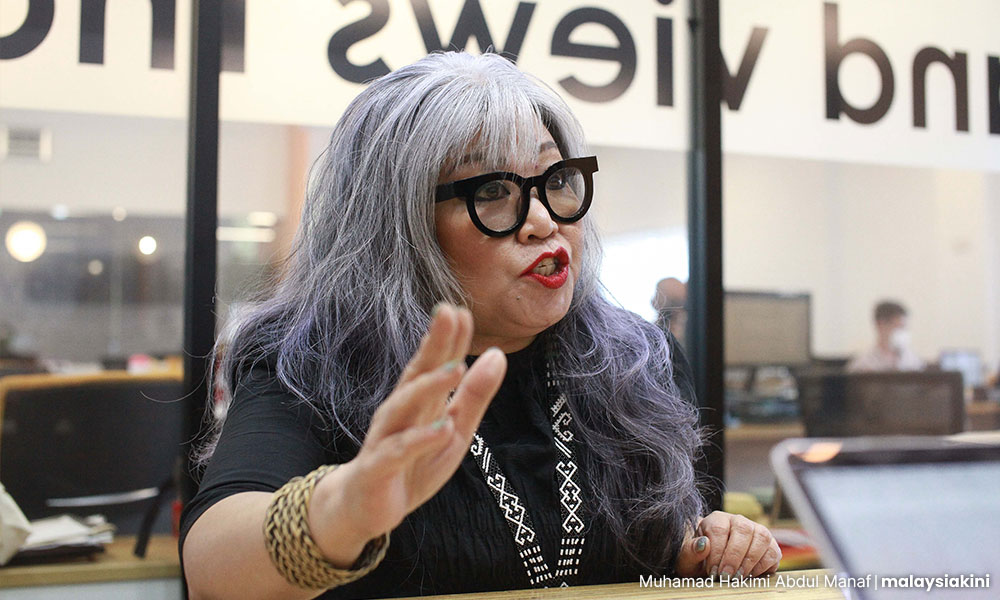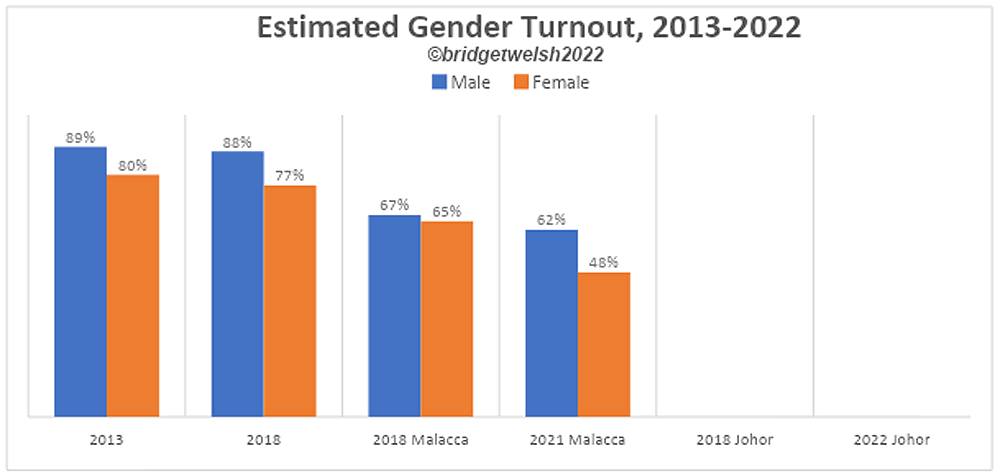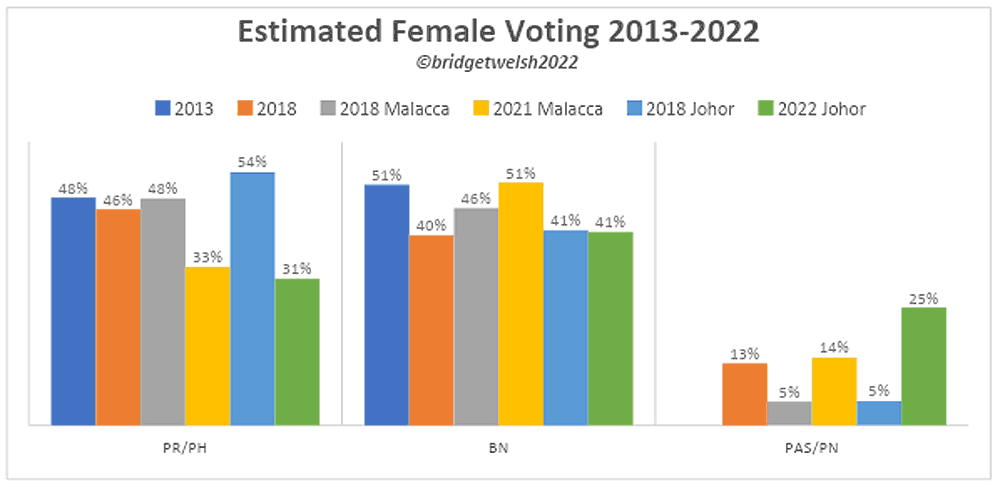With the formal nomination of candidates this weekend, attention turned – at long last – to women in GE15, or rather the lack of them. A meager 127 women, or 13.5 percent of all the candidates, are running for parliament. This is not a significant increase in women running for office compared to earlier elections.
Illustrative, Ahmad Zahid Hamidi’s Umno slated only 16 female candidates, the lowest share in decades from the party that helped bring about female representation in Malaysia. Altogether, Umno/BN slated 29 women.
By contrast, Muhyiddin Yassin’s PN fielded only 15 women – a shockingly low figure. This is not a surprise given the dominance of PAS in this coalition, but it also speaks to how low Bersatu values female leadership. The PN coalition is known for removing women from GLC appointments when it assumed power, especially those that were seen as successful in their jobs.
This 4th piece in my “On the Road to GE15” series looks at the role of women, highlighting patterns of displacement of female candidates and the (limited) engagement with women voters.
It includes my research on ordinary women’s participation in elections and shows that female voters are being largely ignored by political parties, even as they remain critical in shaping electoral outcomes. Ironically, the coalition that is placing the less value on female leadership is gaining the most female support in recent polls.
Female candidate displacement
Looking back, Malaysia’s female representation in Parliament has not increased significantly in recent elections, with only 15 percent in the last parliament. This is far below the global average of 28.6 percent and even further from the professed target of 30 percent of many Malaysian parties.
Despite considerable progress for women’s empowerment in the past, Malaysia has not made major steps in recent years. Malaysia ranks 103rd out of 146 in the World Economic Forum's Global Gender Gap Index 2022, below her neighbours, with Singapore at 49th, Thailand 79th and Indonesia 92nd.
Issues such as female involvement in the economy, gender parity in wages, blatant sexism and harassment, to name just a few, remain serious challenges. The trajectory of empowering women politically has not improved despite the central role that women play in Malaysia’s economy and society.
Politically, the limited participation of women in the election is not just in the low numbers of candidates, but also in how they were fielded.
First is the trend of pitting women against women. This is most obvious in Ampang, where four women are contesting from the major coalitions. This is also the case in Sepang (three candidates), Kapar and Sandakan (both with two candidates).

A large number of the women running are independents, such as Siti Kasim in Batu, where three female independents join the large field of ten competitors. While 100 contests have at least one female candidate, 20 of these contests have more than women candidate.
Second is the placement of women by the major coalitions in less winnable seats. After dropping the warlord in Padang Besar in Perlis, Umno put in a woman candidate, Zahida Binti Zarik Khan, who faces a tough battle. The same occurred in Tanjong Karang, where the women’s chief Habibah Mohd Yusof has been pitted against the dynamic social activist fielded by Muda, Cikgu Rahaya Baharin.
MCA has the practice of putting its female candidates in unwinnable seats, such as Tan Kim Nee in Tanjong in Penang, leaving the winnable seats to men. They also adopt the sexist old fashion framing of putting a “pretty face”.
Even worse is the displacement of existing women leaders. Notably, Bersatu moved the former women’s minister Rina Harun to a less safe seat, in keeping with the displacement of women pattern of this coalition.
None of the coalitions prominently feature women leaders. All too often women are treated as secondary, even with tokenism, not respected within parties and this translates into less support and resources for their campaigns. Media attention on women candidates is generally less, with even less attention to the issues that women care about.
Not all the parties do this across the board – Amanah has placed its Women’s Chief in Aiman Athiran al Jundi in Sepang, for example, and both PKR and DAP have fielded their women leaders in their safe seats, including moving the recently unfairly attacked Yeo Bee Yin to Puchong.
Harapan has given women a better chance to win in many (although not all) of the seats it has fielded women, as is the case for some of the Umno, PAS and Muda women candidates as well.
Lower female voter participation
Fielding fewer (winnable) women candidates is a broader reflection of less political participation of women. This pattern extends to ordinary voters. Parties do not engage them adequately.
Consistently over elections, female turnout is lower than that of men. In 2018 the gender gap difference was an estimated 11 percent, an increase from an estimated 9 percent in that of GE13.
In Malacca 2021, where a woman was slated as the first possible chief minister, there was more parity in turnout, but the gender gap widened in Johor 2022 by a difference of an estimated 14 percent.

Women are not being brought into the political process, even ordinary female voters. This is partly because there is often little engagement with them and the issues they care about, including health and education. As with the candidates, women voters are often treated as secondary.
If they are engaged, they are treated with stereotypes – as mothers with children, rather than single, unmarried or widowed. Even less attention is placed on variation among women, as evident in the manifestos of the different coalitions that prioritise these stereotypes in their proposals.
Changing female electoral support
They do this at their own electoral peril. Despite lower turnout female votes matter. Votes from women were decisive in Harapan’s victory in 2018, largely in part because of the 11 percent drop in support from women for Umno, with PAS capturing 13 percent support from women in GE14. Then PAS played the role of undercutting Umno.
This pattern has changed, as this coalition is now undercutting Harapan. PAS and PN are winning more support from women, as evident in both Malacca (estimated gain of 9 percent) and Johor 2022 (estimated gain of 20 percent).
This comes ironically when the PN coalition does not meaningfully espouse a women’s agenda, and instead relies primarily on patronage of its quickly-gotten resources in its campaigning.
Data shows that Harapan has a recent disconnect with women voters, losing female support sharply in recent state elections, estimated 15 percent in Malacca 2021 and estimated 23 percent in Johor 2022.
Similarly, the base of support of women for Umno has not increased significantly, although there was a small gain in Malacca of estimated 6 percent. Umno still holds the larger balance of power of women, although not to the same degree as in the past.

Both Umno and Harapan are taking women’s electoral support for granted. As other parties/coalitions inadequately politically engage and maintain support from women, those that offer female voters immediate rewards, as in PN, are winning them over. Here the impact of Covid on livelihoods is important. Women are after all on the frontline of spending for families and trying to survive the higher cost of living.
Leaving women out of leadership, messaging and political engagement, has a political consequence; not only do parties lose support but they make women vulnerable to a campaign that uses them to win elections but delivers little once they are in power.
From displacement of candidates, lower female turnout and shifts in voting, the trends point to less female power of women. This does a tremendous disservice to Malaysia, not only to its women but to everyone. - Mkini
BRIDGET WELSH is an honorary research associate of the University of Nottingham, Malaysia’s Asia Research Institute (Unari). She is also a senior research associate at the Hu Fu Centre for East Asia Democratic Studies and a senior associate fellow of The Habibie Centre. Her writings can be found at bridgetwelsh.com.
The views expressed here are those of the author/contributor and do not necessarily represent the views of MMKtT.



No comments:
Post a Comment
Note: Only a member of this blog may post a comment.